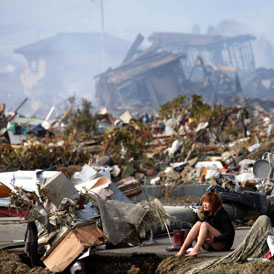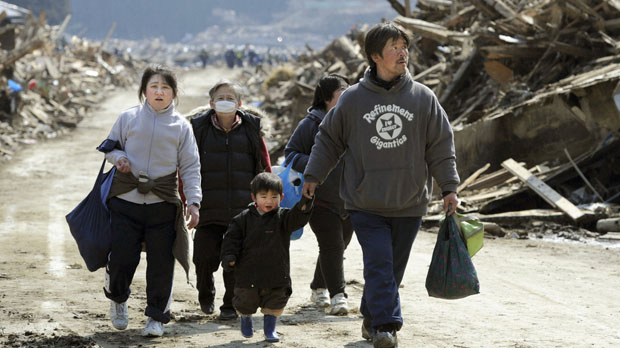Japan: race to supply water and medicine as bodies wash up
Britain offers nuclear advice as a UK search team arrives in Japan’s quake disaster zone. Charities tell Channel 4 News only now is the scale of the disaster emerging as bodies wash up on the coast.
Officials in Japan‘s north-eastern district of Miyagi said that around 1000 washed up bodies were found scattered across the coastline at Minamisanriku, as further bodies are found on nearby shores.
At least 10,000 people are likely to have died in Miyagi alone following Friday’s devastating earthquake.
A British search and rescue team has arrived at their base, 20km outside Ofunato. The Foreign Office has confirmed the UK has offered nuclear advice, humanitarian assistance and help with disaster victim identification to the Japanese government.
Read more – Japan: another explosion rocks Fukushima nuclear plant
In Iwate, 574 people have been confirmed dead, although the final death toll there is expected to be much higher. In Sendai, 200 to 300 bodies have been found in Wakabayashi district.

The city of Rikuzentakata was “almost completely wiped out” according to the city’s fire department, raising fears for its 23,000 inhabitants. In nearby Otsuchi 80 per cent of the town’s 15 000 citizens are missing.
Children will be terrified and desperately in need of structured help. Steve McDonald, Save the Children
The Japanese government has doubled the number of troops from its Self Defence Force to 100 000, the largest mobilisation of forces since the second world war. Working alongside regional coast guards and police teams, they’ve so far evacuated over half-a-million people across Japan.
Almost two-million households were without power in the freezing north and around 1.4 million people were without running water, the government said. Large areas of the countryside are surrounded by water and unreachable, whilst fuel remains in critically short supply.
Channel 4 News special report - Japan: tsunami to nuclear crisis
Michiko Yamada, 75, said she ran to the rooftop of a hospital and stayed there for 12 hours with her husband in complete darkness.
“I ran away with what I’m wearing, barefoot. It was truly cold,” she said at a middle school shelter in Rikuzentakata.
“I don’t have anything now. No money, no house. “I’m on way now to borrow socks from my relatives.”
The chronic diseases of some of these elderly people are a cause for concern. Mikiko Dotsu, Medecins Sans Frontieres
Medecins Sans Frontieres told Channel 4 News that as access improves, the scale of the disaster has become even clearer, especially in rural areas.
Mikiko Dotsu, the coordinator of the MSF team said: “There are serious needs among pockets of populations in areas that had previously been impossible to reach by road.
“In one area around Minamisunriku, in northern Miyagi, we were told by officials there were 9,200 people in 20 evacuation centres who needed water, non-food items and medical attention.
“Although injured people had been evacuated by helicopter, there were a lot of elderly people, some of whom were dehydrated,” he said.
“The chronic diseases of some of these elderly people are a cause for concern.”
The charity has now sent more doctors to the area in and around Sendai, on top of a ten-strong team already deployed there, and say they need more oxygen, non-food items, medical items, and water.
Save the Children is particularly concerned for the psychological well being of an estimated 100,000 young people displaced in Japan. The charity has launched a £1m appeal to help children to overcome shock and distress.
Steve McDonald, who is leading the charity’s emergency response in the country, said: “We know from experience that, especially with the ongoing aftershocks still being felt here and fears of another tsunami, children will be terrified and desperately in need of structured help.”
The team in Sendai is focusing on vulnerable children and families, setting up protective environments where children can spend time with other children and trained teachers. It is hoped it will allow parents much-needed time to find food, work and accommodation as well as locate other friends and family.

International response
Some 70 countries have offered assistance to Japan, with help coming not only from allies like the United States but also countries with more strained relations like China, and even from the Afghan city of Kandahar.
A 63-strong UK International Search and Rescue team has arrived in Ofunato, 100 miles north of Sendai on the east coast.
Around 17,000 UK nationals are known to have been in Japan when the earthquake hit, and the Foreign Office has fielded calls from more than 4,000 relatives and friends of those believed to have been caught in the disaster.
The US has sent nine warships with humanitarian aid, led by the aircraft carrier USS Ronald Reagan, underlining the close military ties with its Pacific ally.
We do not yet know the full and dreadful death toll, nor can anyone truly understand the impact these events will have. David Cameron
China was quick to offer its condolences, sending a 15-member rescue team and $5m worth of aid. Setting aside an often uneasy relationship with Japan, Premier Wen Jiabao said: “I want to use today’s opportunity to extend our deep condolences for the loss of lives in this disaster and to express our sincere sympathy to the Japanese people.”
“When the massive Wenchuan earthquake hit the Japanese government sent a rescue team to China and also offered supplies,” he continued, referring to the 2008 Sichuan earthquake that killed more than 80,000 people.
Missing Britons
There are “severe concerns” about Britons still missing in Japan four days after the devastating earthquake and tsunami, David Cameron has said.
There have so far been no confirmed reports of British fatalities in Friday’s disaster. The PM told the Commons: “It has been heart-breaking to listen to people who have had all their relatives, their friends, their possessions and their homes simply washed away. Those who have survived will not recognise the place where their homes once stood.
“We do not yet know the full and dreadful death toll, nor can anyone truly understand the impact these events will have, but Japan and the Japanese people are a resilient and resourceful nation. Britain and the British people are your friends and we have no doubt you will recover.”
-
Latest news
-
Year of civil war in Sudan ‘a nightmare of hunger and displacement’4m

-
Israel fears repeat Iran attack, says former editor of Jerusalem Post4m

-
How long could it take to clear the Rwanda asylum seeker backlog?3m

-
Rwanda asylum boost for Sunak as bill expected to become law2m

-
Donald Trump trial: day one of historic Stormy Daniels court case4m

-




